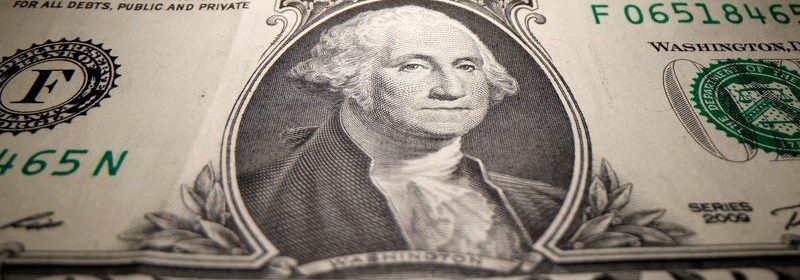Dollar holds its ground as markets focus on rising yields

LONDON (Reuters) – The U.S. dollar pared losses after reaching multi-year lows against sterling and the Australian dollar on Monday as traders focused on whether vaccine progress, expectations for faster economic growth and inflation would push bond yields higher.
Yields on 10-year U.S. and German government bonds touched one-year and eight-month highs respectively before retreating as Europe’s trading session advanced to midday.
The U.S. dollar index rebounded from lows hit during the night but gradually slowed and was broadly unchanged, down 0.03% at 90.255.
“Monday mornings don’t necessarily tell me much”, said Kit Juckes a strategist at Societe Generale, adding that a clearer trend might emerge once trading resumes in New York.
“The market is still short in dollars”, he said, pointing out to the likelihood of a “shake out” should U.S. yields continue their rise towards 1.5%.
The euro gained against the dollar, rising 0.17% to $1.2138 after data showed German business morale rising more than expected in February thanks notably to the resilient industrial sector.
Traders were also waiting for a speech at 1345 GMT by European Central Bank President Christine Lagarde.
Commerzbank analyst Ulrich Leuchtmann argued that much at stake for the relationship between the euro and the dollar lies in the growth differential between the two economies.
“Where EUR-USD is going to go medium-term depends on whether the U.S. economy really will be able to achieve a stronger post-lockdown boom than Europe”, he said. He expects the common currency to suffer in that regard in the first half of 2021.
The British pound held the $1.40 line after reaching 1.4050, its highest since April 2018, as Prime Minister Boris Johnson announced a path out of lockdowns on the back of rapid vaccinations.
The Aussie rose as much as 0.5% to an almost-three-year high of $0.7908 before letting the dollar come back to 0.7889.
The kiwi hit $0.7338, also its best since early 2018, helped by S&P’s upgrade of New Zealand’s sovereign credit ratings by a notch, but also saw the U.S. dollar pare some losses.
In the cryptocurrency market, bitcoin eased from the record high of $58,354.14 it reached during the weekend, retreating to $53,441.
The most popular cryptocurrency had almost doubled year-to-date and reached a market capitalisation of $1 trillion on Friday, boosted by gaining acceptance among mainstream investors and companies like Tesla Mastercard.
Source: Read Full Article
